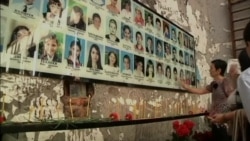This week, Russians have been observing the 11th anniversary of the attack by Islamic militants on a school in Russia's North Caucasus region that killed more than 330 hostages, including 186 children. The three-day siege and massacre that started on September 1, 2004 took place in Beslan, a town in the republic of North Ossetia, and is one of the bloodiest terrorist acts ever in Russia.
The mood was somber at School Number One in Beslan as hundreds of mourners poured into the school for a memorial service for the victims of an attack that still reverberates across the region.
Pictures of the dead lined the walls, and people laid flowers in the school's bullet-scarred gym where hundreds of hostages were held for three days.
Students released into the sky 334 balloons, one for every victim of the attack.
Many people argue those responsible for the attack should face justice.
"We've said that this crime has to be investigated in an objective way in Russia, and all those guilty should be named and punished -- both people and state bodies. But the Russian authorities haven't accepted our friendly agreements, which means they do not want to find and punish the guilty ones," said Susanna Dudiyeva, head of the Beslan Mothers Committee.
In the attack, about 30 mostly Chechen and Ingush Islamic militants seized the school and took more than 1,100 people hostage, including nearly 800 children. Most of the hostages were held in the school's gym, with no food and water, during a 52-hour standoff.
Russian security forces stormed the gym on the third day and fought with the hostage-takers. In addition to the hostages who were killed, hundreds were wounded.
Many people have since taken legal action against Russian authorities, saying their basic rights were violated during the rescue operation. The European Court of Human Rights has agreed to consider their complaints.
"All our requests are reflected particularly in Article 13 [of the European Convention on Human Rights]: the fact that the terror attack was not prevented, unjustified use of heavy weaponry, denial of negotiations, untimely fire extinction and leaving people in danger," said Dudiyeva.
Chechen separatist leader Shamil Basayev, who was killed in 2006, allegedly controlled the group that carried out the attack.





